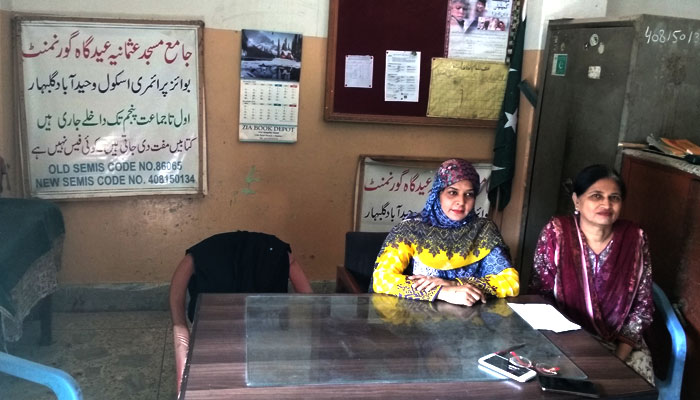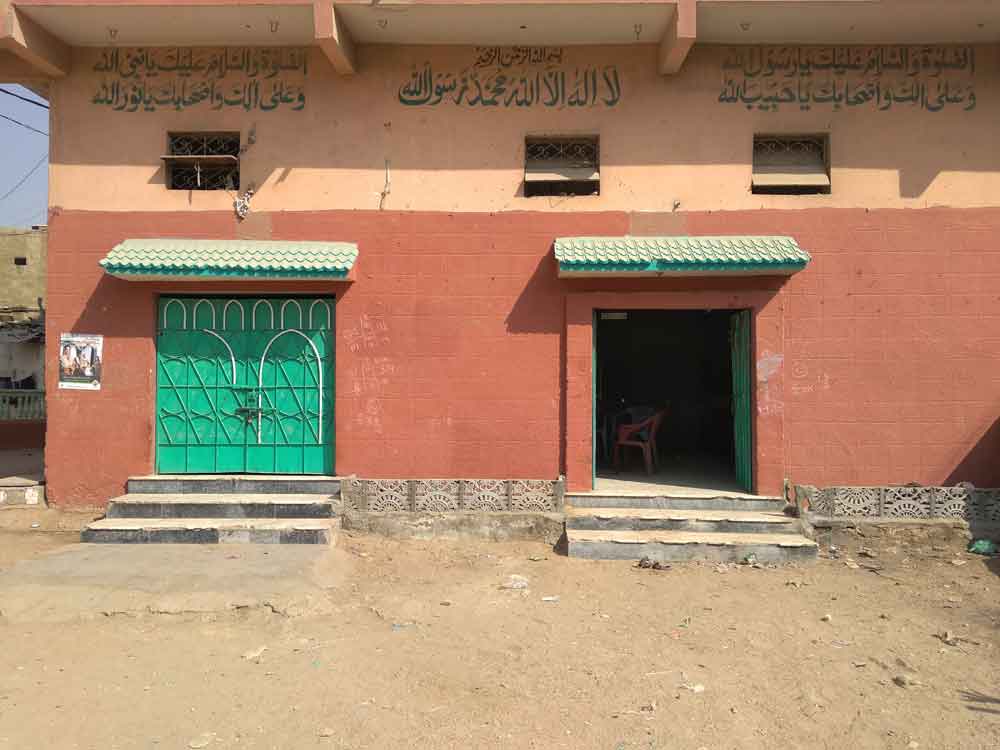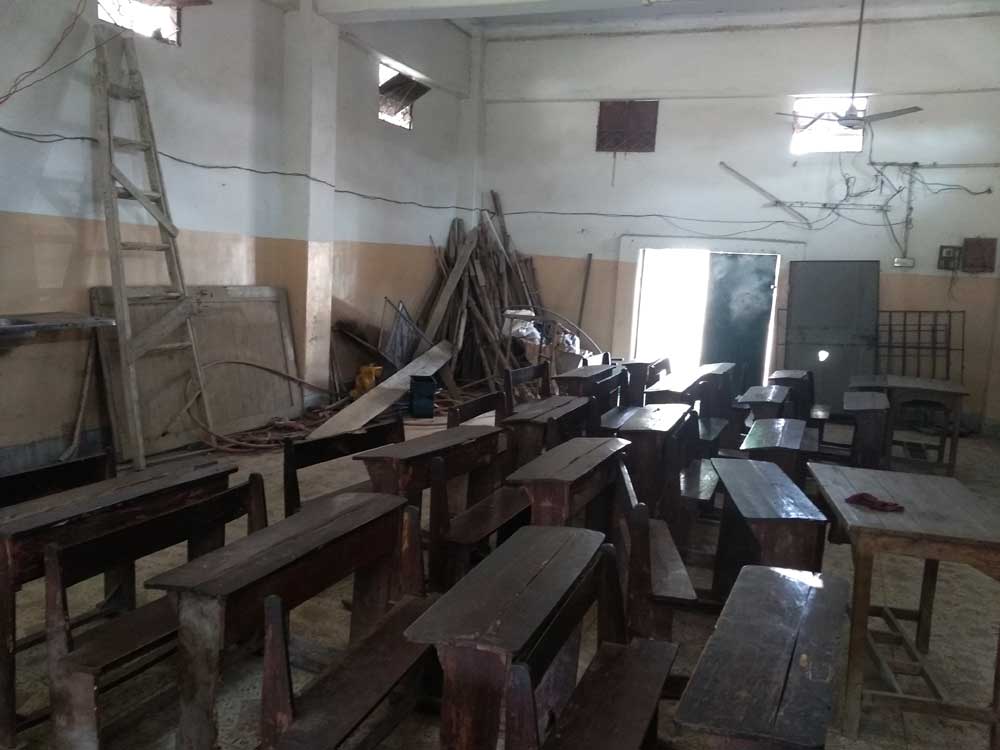Fate of Masjid schools hangs in the balance amid official neglect
On an early mid-November morning, residents of a densely-populated Gulbahar locality gathered at a dusty ground to mediate a dispute among female teachers of a primary school and the local Eidgah committee.
The bone of contention: a two-storey building in the far corner of the same ground, which is used as an Eidgah twice a year. The angry teachers chastised the Eidgah committee members for insisting that they and their students vacate the primary school functioning on the ground floor of the building. But, the committee members didn’t budge from their stance.
After an exchange of heated arguments, mediators from the neighbourhood finally managed to calm the teachers and the committee members. To settle the dispute for now, it was decided that the committee would have the right to use the school’s building until the relevant authorities shift it somewhere else. In the meantime, the teachers and students would continue their academic activities in the building that they share with a seminary which operates on the first floor.
The school – Government Boys Primary School Jamia Usmania – is named after a nearby mosque and has 70 students enrolled, including girls. It was established in 1984 under the Masjid/Maktab school programme which was initiated in 1978 and enabled community leaders of a neighbourhood to establish public schools in local mosques.
It has been functioning in the building since then, but five years ago the Eidgah committee members allowed a madrasa to be set up on the first floor as well, and now the members are flexing their muscles to take over the school’s space.
Although the Eidgah committee has no official or legal authority, its members claim that the building belongs to them as they are the neighbourhood’s representatives and the decision of what to use it for should be theirs. According to the school’s headmistress, the committee wants the school to be moved elsewhere because they intend to use the ground floor for commercial activities, like renting to shopkeepers. However, when approached, a committee member declined to comment saying it was their internal matter.
Frightened teachers
Headmistress Shamim Baig has been running the school for the last 32 years and inaugurated it more than three decades ago. “I wanted the children of the vicinity to be educated. For such a good cause, the then provincial minister Al-Haj Shamimuddin had also provided funds,” she said.
The school has been functioning with no ownership disputes since then. Even when criminal gangs sprung up in the area and turned it into a no-go zone, it continued to function. “The police would recover dead bodies from the nearby Khajji Ground almost daily, but our school’s activities remained uninterrupted,” Baig said.
These days however, Baig is running pillar to post, visiting the office of the relevant authorities, seeking protection for her colleagues and students. But her complaints have fallen on deaf ears.
“I’m an aged schoolteacher and can’t face those aggressive people [Eidgah committee members],” she said. “I request the authorities to provide us safety.” She also questioned why the committee was not evicting the first floor seminary but seemed bent upon expelling the school.
Naghma Parveen who has been teaching at the school for the last 24 years said, “We spent time convincing parents to send their kids to the school. If it is moved now, these kids won’t get another opportunity of getting education.”
The Eidgah committee members are consistently threatening the teachers. They have even placed welding machines and iron rods and dumped construction material in the school premises right where children attend their classes. This has blocked the way to the toilets and has created a hazardous environment. Two months ago, Sarwat Waseem, a teacher, was severely injured when an iron rod pierced her foot.
GBPS Jamia Usmania is neither the first nor the only school to face such kind of threats from local committees. In October, teachers of the District Municipal Corporation Boys Primary School located adjacent to Jahangir Masjid in Martin Quarters also dealt with a similar issue.
The Masjid committee was demanding that they be allowed to increase the rent or the school would be asked to vacate the building, but the teachers said they had no authority over financial matters and were not willing to move. However, after negotiations and with the influence of community elders, the dispute was temporarily settled.
The policy
The Masjid schools programme was introduced by the then president and military ruler General Ziaul Haq in 1978 with the aim to establish 5,000 mosque schools, according to a study on Masjid schools jointly published in 2016 by the University of Punjab and Bahauddin Zakariya University. “The experiment of Masjid or Maktab schools was cost-effective to achieve the goal of 100% literacy rate,” it stated.
Originally, they were meant to teach students up to grade three, but were later upgraded to grade five, making them primary schools.
The National Education Policy of 1998-2010 stressed upon the utilisation of mosque schools to increase the literacy rate, and recommended to expand the existing Masjid schools as non-formal basic education to a larger scale by opening 75,000 schools till 2001, the study further elaborated.
A failing experiment?
Qari Tauheed Khan, a teacher at a Jamia Masjid Primary School Paposh in North Nazimabad, explained that initially Masjid schools were accommodated inside mosques and the Qaris or Imams were tasked to teach. However, that can be a potential problem for students because if the Imam or Qari is replaced, the new cleric usually bars students from coming to study for personal gain, including wanting the authority to run his own madrasa or not wanting to teach students in a place of worship.
Qari Khan said that this was a big problem because Masjid schools can be very beneficial for children who attend madrasas as such schools offer access to formal education which many madrasa students usually do not have.
However, a majority of educationists are of the view that Masjid schools are no longer effective or needed. “The only aim of starting Masjid and Maktab schools was bringing the Imams and Qaris into government jobs and these tactics were used during the tenure of former dictator General Ziaul Haq,” said Emeritus Professor of Karachi University Dr Tauseef Ahmed Khan, adding that these schools “have no worth”.
He added that Masjid schools can also be problematic as sometimes clerics bar teachers from entering the premises if they happen to be women or if they belong to a different sect.
No concern
Senior officials of the Primary Schools Directorate Karachi (PSDK) and the School Education and Literacy Department (SELD) admitted they were unaware about the number and status of Masjid schools operating in the city.
As per data collected by the SELD’s Reforms Support Unit, there are 158 Masjid schools in the city. However, the PSDK and SELD officials said that they didn’t trust the statistics being collected by the RSU.
When contacted, SELD Special Secretary and PSDK Director Ghulam Abbas Detho said that he had no knowledge about Masjid schools in the city, and he would collect the information from his subordinates and would let The News know.
PSDK Additional Director Muhammad Salim Awan said that a decade ago they had information on mosque schools, but now the directorate has no statistics on the current status of those schools.
However, while these officials had no information on such schools, Nawazish Ali Jilani, who is Masjid Schools’ Drawing and Disbursing Officer, said that the Accountant General Sindh still issues salaries of the teachers deployed at Masjid schools.
According to Jilani, the teachers receive salaries on the basis of seniority ranging from Rs40,000-60,000. However, the SELD has made no fresh appointments since 1996. “Mosque schools are not effective any more and the SELD may merge them into mainstream schools,” he said.
-
 Eric Dane's Costar Under Fire For Hurling Accusations At Him After His Death
Eric Dane's Costar Under Fire For Hurling Accusations At Him After His Death -
 Queen Camilla Greets The Paddington Bear At BBC’s 500 Words Grand Final
Queen Camilla Greets The Paddington Bear At BBC’s 500 Words Grand Final -
 Chinese Astronauts Finally Reveal Why Spacecraft Left Them ‘stranded’ For 437 Days In Space
Chinese Astronauts Finally Reveal Why Spacecraft Left Them ‘stranded’ For 437 Days In Space -
 Sinitta Makes Shock Admission About Marriage To Andy Willner Post Simon Cowell Heartbreak
Sinitta Makes Shock Admission About Marriage To Andy Willner Post Simon Cowell Heartbreak -
 Bill Gates Calls Ties To Jeffrey Epstein 'huge Mistake,' Reveals Past 'affairs'
Bill Gates Calls Ties To Jeffrey Epstein 'huge Mistake,' Reveals Past 'affairs' -
 Switzerland Announces One-time Compensation For Swiss Bar Fire Victims
Switzerland Announces One-time Compensation For Swiss Bar Fire Victims -
 Ryan Coogler Shares Thoughts About Building Community Of Actors Amid 'Sinners' Success
Ryan Coogler Shares Thoughts About Building Community Of Actors Amid 'Sinners' Success -
 Heidi Klum Gushes Over Diplo Collab 'Red Eye' Despite DJ Falling Asleep During Video
Heidi Klum Gushes Over Diplo Collab 'Red Eye' Despite DJ Falling Asleep During Video -
 Israel Behind Majority Of Journalist Deaths Worldwide, Watchdog Claims
Israel Behind Majority Of Journalist Deaths Worldwide, Watchdog Claims -
 'It Would Become A Circus' : Inside Jane's Turmoil For 'little Sister' Fergie Whose Hidden From The World
'It Would Become A Circus' : Inside Jane's Turmoil For 'little Sister' Fergie Whose Hidden From The World -
 Inside Cardi B's Real Feelings Related To Stefon Diggs Split Post One Year Of Romance
Inside Cardi B's Real Feelings Related To Stefon Diggs Split Post One Year Of Romance -
 Former Sri Lankan Intelligence Chief Arrested Over 2019 Easter Bombings
Former Sri Lankan Intelligence Chief Arrested Over 2019 Easter Bombings -
 Kristen Bell Shares One Rule For 'SAG' Awards Ceremony That She Will Ditch This Time: 'Happy And Fun'
Kristen Bell Shares One Rule For 'SAG' Awards Ceremony That She Will Ditch This Time: 'Happy And Fun' -
 Woman Suing Meta Platforms, YouTube Over Social Media Addiction Sticks To Claims After Trial
Woman Suing Meta Platforms, YouTube Over Social Media Addiction Sticks To Claims After Trial -
 Shakira Applauded For 'gracious' Behaviour By Fans As She Blends Work With Family Downtime
Shakira Applauded For 'gracious' Behaviour By Fans As She Blends Work With Family Downtime -
 Mexico’s President Considers Legal Action Over Elon Musk Cartel Remark
Mexico’s President Considers Legal Action Over Elon Musk Cartel Remark






